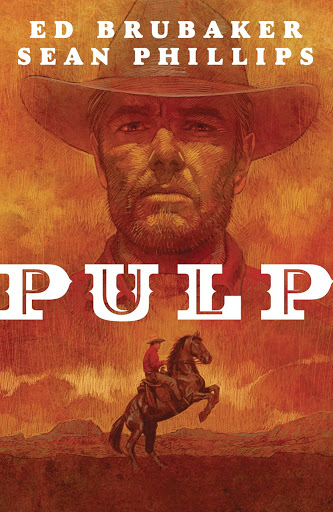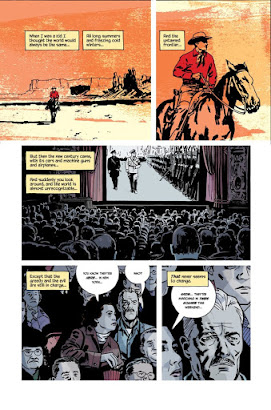The Give Me Comics or Give Me Death podcast is available from all your usual podcast providers, or see all episodes here
Clearly writer Ed Brubaker and artist Sean Phillips realised they'd found success - both artistically and commercially - with their modern noir series Criminal and whilst that recently relaunched series continues in its rich vein of form, the pair have also cleverly diverged into projects that put a twist on their formula; the Lovecraft influenced Fatale, super-heroes with Incognito (and the excellent Sleeper, which pre-dates Criminal), the Hollywood setting of The Fade Out, and the supernatural in Kill Or Be Killed. This time around the USP is a tale set in the Wild West, although in typical Brubaker/Phillips (Bruillips? Phillbaker?) fashion things aren't all that they initially seem to be.
Behind the gorgeous sepia-ish cowboy cover by Phillips lies a story set in New York City 1939, where lead character Max Winters is a down-on-his-luck comic book writer. Now, granted almost all of the characters in these Brubaker/Phillips stories are down-on-their-luck. but we're on a steady run of people associated with the comic book industry being the most down in the least luck of anyone - I'm pretty sure we've got the message now. Anyway, Max's comic is a cowboy title called Six Gun Western, and unbeknownst to all - his editor especially - the tales are autobiographical and based on Max's life as a wild west outlaw. When the escapades of Max's past take a less cowboy turn his editor starts to turn over the title to younger, cheaper, writers who will stick with the formula that made it popular to be begin with. Its a not so subtle nod at the real life developments of the industry on the eve of the second world war. Needless to say this development leads to cash concerns for Max, which as we know by now is Brubaker's starting point for a bad plan for a bad crime with bad people with a bad ending. As so it is.
One of the most arresting aspects of the story is the realisation that the time between that wild west of cowboys and outlaws, and what we now consider the modern day, was incredibly short. The lead character lives from a time when there was essentially a lawless hinterland of sparsely populated America, to the bustling mega city of New York and the industrialised and mechanised 20th century society. Its a transition that isn't really tackled by the comic - other than the obvious 'there's outlaws in any era' message - and in fact its more focused on the future with the Nazi occupation of Europe and the impending American involvement in the war. There is also a clear parallel with contemporary America as home grown fascist agitators feature heavily in the story - though I'm sure it would stir up a hornet's nest if I were to label Jeremiah Goldberg, Max's former enemy turned partner-in-crime, as Antifa.
We're not completely mis-sold on the promise of the cover however. Flashbacks to Max's outlaw past are presented as pages from his western comic. This gives Phillips an opportunity to stretch his artistic legs a little and present us with a homage to poorly printed weather worn pages of a 1930's comic, complete with a subtle but appreciated change of lettering and narrative boxes. The complementary colouring throughout the book is by Phillip's son, Jacob, who has just recently branched out on his own as artist for Image Comics' That Texas Blood. The Six Gun Western pages add something different and do make this feel like something more than just a Criminal story in disguise. My only complaint is we don't see enough of them - I could quite happily read a western book based on this if Brubaker and Phillips were so inclined.
Given this pair's output is always of the highest quality its no surprise that Pulp turns out to be a gripping and excellent read, where yet again they find a way to spruce up their usual noir approach with a slant that feels refreshing but also completely natural. M.
Pulp
Ed Brubaker / Sean Phillips
Image Comics

No comments:
Post a Comment